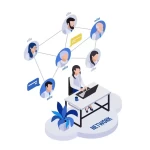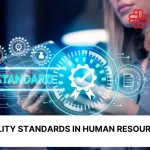In recent years, the nature of work has undergone a significant transformation. With the advent of technology and the growing trend of remote work, the concept of remote management has become increasingly important. Remote management refers to the practice of supervising and guiding teams who are geographically dispersed, often working from different locations. It requires a unique set of skills and strategies to effectively lead remote teams and achieve desired outcomes.
This blog post aims to provide insights into remote management and offers practical tips to enhance your remote management skills. We will explore why remote management has gained prominence, discuss eight valuable tips for managing remote teams, and emphasise the significance of proper meeting etiquette in remote work environments.
Why Has Remote Management Become Important?
Remote management has gained immense importance due to several factors. First and foremost, technological advancements have made it feasible for teams to collaborate seamlessly from anywhere in the world. This flexibility allows companies to tap into a global talent pool and build diverse teams. Moreover, remote work offers numerous benefits to employees, such as increased autonomy, better work-life balance, and reduced commuting time, leading to higher job satisfaction and productivity.
Additionally, the COVID-19 pandemic accelerated the adoption of remote work practices, making remote management even more crucial. Organisations had to quickly adapt to remote work setups to ensure business continuity and the safety of their employees. As a result, managers had to navigate the challenges of leading remote teams effectively, fostering team cohesion, and maintaining productivity.
How Do Managers Feel About Running Remote Teams?
A study conducted by Harvard Business Review shed light on the struggles experienced by many managers, highlighting the need for additional support and better quality management. Interestingly, the research also revealed that improving management practices can have a positive impact on the well-being and performance of remote workers.
The study, which examined 215 supervisors and managers, found that approximately 40% of them expressed low self-confidence in their ability to effectively manage remote teams. This lack of self-efficacy signifies a common hurdle faced by managers in remote work arrangements. It becomes evident that addressing these challenges and providing the necessary support is crucial for managers to succeed in leading remote teams.
Further research conducted by the National Library of Medicine emphasises the importance of continuous skill development in remote work environments. The study identified that skill enhancement plays a vital role in facilitating successful remote work. Specifically, leaders should focus on increasing their knowledge in managing virtually and improving technology literacy across all levels of the organisation. These areas of skill development are essential in navigating the intricacies of remote work and ensuring a smooth transition into a remote management approach.
Table 1: The Role of Skill Development in Remote Management
Skill | Description |
Technology Literacy | Proficiency in using digital tools, project management software, and virtual collaboration platforms. |
Effective Communication | The ability to convey information clearly and facilitate transparent communication within the team. |
Adaptability | Being open to change and adjusting strategies to suit the dynamics of remote work environments. |
Empathy | Understanding and considering the emotions and perspectives of remote team members. |
Time Management | Efficiently organising tasks and meetings to maximise productivity in a remote setting. |
Recognising the challenges faced by managers and the significance of skill development, it is imperative to explore practical strategies to enhance remote management skills, which we will be discussing in a minute. By incorporating the right techniques and adopting a proactive approach, managers can overcome the hurdles and effectively lead their remote teams towards success.
10 Tips for Managing Remote Teams
If you’re one of the managers who don’t feel confident in leading remote teams, we’re here to help you by providing you with ten valuable tips that can help you effectively manage your remote teams and foster a thriving work environment:
1- Set Clear Expectations
Setting clear expectations is foundational to successful remote management. Clearly communicate goals, deadlines, and performance expectations to remote team members. Define key deliverables and ensure everyone understands their roles and responsibilities. Regular check-ins provide opportunities for feedback and addressing any concerns.
2- Foster Communication
Effective communication in remote teams goes beyond the exchange of information; it's about building connections and maintaining a sense of camaraderie. Managers must encourage open and transparent channels, utilising a mix of communication tools such as email, instant messaging, video conferencing, and project management software. Establishing regular team meetings provides an opportunity for not only work-related discussions but also casual interactions, reinforcing a sense of belonging.
3- Build Trust
Trust is the linchpin of successful remote management. Managers must resist the urge to micromanage and instead empower team members by trusting them to fulfil their roles effectively. Autonomy is a key factor in building trust – providing team members the freedom to make decisions within their scope of work fosters a sense of responsibility and ownership. Reliability, responsiveness, and supportiveness from managers further solidify the foundation of trust within the team.
4- Establish a Virtual Workspace
Creating a cohesive virtual workspace is vital for efficient collaboration. Leveraging project management tools, cloud storage, and file-sharing platforms centralises resources, ensuring everyone has access to necessary information. Clear and consistent documentation practices, such as using shared documents or collaborative platforms, help maintain organisational knowledge and streamline processes.
5- Prioritise Team Engagement
The remote work environment can sometimes lead to feelings of isolation. To counteract this, managers should actively foster a sense of belonging and engagement. Virtual team-building activities, whether they involve games, challenges, or shared experiences, contribute to team cohesion. Recognising individual and team accomplishments, even through virtual means, is a powerful motivator that enhances morale and engagement.
6- Adapt Communication Styles
Recognising and respecting diverse communication preferences within the team is essential. Different team members may have varying preferences for written communication, video conferencing, or other mediums. Managers need to be adaptable, accommodating these preferences to ensure effective collaboration and understanding among team members.
7- Promote Work-Life Balance
Remote work can blur the lines between personal and professional life. Managers should actively encourage a healthy work-life balance by setting clear expectations regarding working hours and respecting personal time. This involves advocating for breaks, time off, and creating a culture that prioritises well-being.
8- Invest in Professional Development
Supporting the professional growth of remote team members is integral to long-term success. Managers can provide opportunities for skill development and learning, such as access to online courses, webinars, or mentorship programmes. Investing in the career progression of team members not only enhances their skills but also fosters loyalty and commitment to the team and organisation.
9- Encourage Knowledge Sharing
Create a culture of knowledge sharing within the team. Establish forums or channels where team members can share insights, best practices, and lessons learned. Encouraging the exchange of knowledge not only enhances individual skills but also contributes to the collective growth of the entire team.
10- Facilitate Social Connections
Acknowledge the importance of social interactions in remote teams. Besides work-related discussions, create avenues for casual conversations. This could include virtual coffee breaks, casual chat channels, or even dedicated time during meetings for non-work-related discussions. Building social connections strengthens team bonds and contributes to a positive team culture.
By integrating these practical strategies into their management approach, leaders can effectively navigate the complexities of remote work, build a cohesive remote team, and drive success in the digital age. The key lies in adaptability, continuous communication, and a genuine commitment to the well-being and development of each team member.
The Importance of Using Proper Meeting Etiquette in Remote Work
Effective meetings are vital for remote teams to collaborate, align goals, and make decisions. When conducting virtual meetings, it is crucial to follow proper meeting etiquette to ensure productive and engaging discussions. Here’s what you can do:
a) Prepare an Agenda and Share it in Advance to Set Clear Expectations
It is crucial to not only outline meeting topics but also provide context and expectations in the agenda. This proactive approach ensures that all participants come prepared, fostering a more focused and productive discussion. Sharing the agenda in advance allows team members to formulate their thoughts, leading to more meaningful contributions during the meeting.
b) Start and End Meetings on Time to Respect Participants' Schedules
Time management is of the essence in remote work, and respecting participants' schedules is a cornerstone of effective virtual meetings. Starting and ending meetings promptly demonstrates a commitment to efficiency and professionalism, allowing team members to allocate their time effectively for other responsibilities.
c) Encourage Active Participation and Create a Safe Space for Sharing Ideas:
Actively involving all participants is essential for harnessing the collective intelligence of the team. Beyond encouraging participation, creating a safe space for sharing ideas fosters an environment where team members feel comfortable expressing their thoughts and contributing to discussions. This inclusivity promotes a culture of collaboration and innovation within the remote team.
d) Utilise Video Conferencing to Enhance Non-verbal Communication and Foster Connection
Video conferencing adds a layer of richness to virtual meetings by allowing participants to pick up on non-verbal cues such as facial expressions and body language. This visual element helps build a stronger sense of connection among team members, mitigating the potential feelings of isolation that can arise in remote work environments.
e) Minimise Distractions and Encourage Participants to be Fully Present During the Meeting
In the virtual realm, distractions are abundant, and maintaining focus can be challenging. Encouraging participants to minimise distractions and be fully present during the meeting contributes to a more engaged and attentive audience. This practice enhances the quality of discussions and ensures that the meeting's objectives are met efficiently.
f) Assign a Facilitator to Ensure Smooth Proceedings and Manage Time Effectively:
Designating a facilitator for virtual meetings is crucial for maintaining order and ensuring smooth proceedings. The facilitator not only guides the discussion but also manages the time effectively, preventing meetings from dragging on unnecessarily. This role is instrumental in steering the meeting towards its objectives and maintaining a productive pace.
g) Summarise Action Items and Follow Up After the Meeting to Track Progress
The conclusion of a virtual meeting is not the endpoint but rather the beginning of actionable steps. Summarising the key takeaways and action items provides clarity on the team's next steps. Following up after the meeting reinforces accountability, tracks progress, and ensures that the decisions made during the meeting translate into tangible outcomes.
In essence, observing proper meeting etiquette in remote work not only enhances the efficiency of team interactions but also contributes to a positive and collaborative team culture. Each element of meeting etiquette plays a vital role in creating an environment where remote teams can thrive, communicate effectively, and achieve collective success.
Future Trends in Remote Management
As the landscape of work continues to evolve, driven by technological advancements and changing societal norms, the future of remote management is poised to witness several intriguing trends. Understanding and adapting to these trends will be pivotal for leaders aiming to stay at the forefront of effective remote team management. Let's explore three compelling developments shaping the future of remote management.
1- Virtual Reality in Remote Collaboration
One of the most exciting trends on the horizon is the integration of virtual reality (VR) in remote collaboration. As technology continues to advance, VR is emerging as a powerful tool to enhance team interactions in the virtual space. This trend goes beyond traditional video conferencing, offering immersive experiences that mimic in-person meetings.
Immersive Team Collaboration
VR enables teams to meet in a shared virtual space, fostering a sense of presence and collaboration. This not only enhances the quality of interactions but also mitigates the challenges of physical distance, making remote work more engaging and interactive.
Training and Onboarding
VR can be utilised for virtual training sessions and onboarding processes, providing a realistic and immersive environment for employees to learn and adapt to new roles. This is especially valuable for distributed teams where traditional in-person training may not be feasible.
Enhanced Creativity and Innovation
Virtual reality can serve as a platform for creative brainstorming sessions and collaborative problem-solving. By creating an environment that stimulates creativity, VR has the potential to unleash innovative thinking within remote teams.
2- Emphasis on Mental Health and Well-being
With the prolonged adoption of remote work, the industry is recognising the impact on mental health and well-being. Future trends in remote management are likely to place a heightened emphasis on strategies that prioritise the psychological and emotional wellness of team members.
Stress Management Initiatives
Remote managers are expected to implement stress management initiatives, acknowledging the unique stressors associated with remote work. This may include virtual wellness programmes, mindfulness sessions, and resources aimed at promoting mental resilience.
Flexible Scheduling and Boundaries
According to Zippia, a significant majority, 72% of employees, consider work-life balance to be a highly crucial factor in their job selection process. Recognising the challenges of work-life balance in remote settings, future remote management trends may involve promoting flexible scheduling and encouraging clear boundaries between work and personal life. Managers will play a crucial role in setting expectations that foster a healthy balance.
Virtual Employee Assistance Programmes (EAPs)
Offering virtual EAPs that provide counselling services, mental health resources, and support will likely become a standard practice. Remote managers may proactively connect team members with these resources to ensure their well-being.
3- AI-Powered Management Tools
The integration of artificial intelligence (AI) in management tools is poised to revolutionise the way remote teams operate. AI can automate routine tasks, provide data-driven insights, and enhance decision-making processes for remote managers.
Automated Task Management
AI-powered tools can assist in automating routine administrative tasks, allowing managers to focus on more strategic aspects of team management. This can include scheduling, document organisation, and data analysis.
Data-Driven Insights
AI can analyse large sets of data to provide valuable insights into team performance, productivity trends, and potential areas for improvement. This data-driven approach allows managers to make informed decisions based on objective metrics.
Enhanced Communication
AI-powered chatbots and communication tools can facilitate smoother communication within remote teams. These tools can offer real-time language translation, summarisation of lengthy documents, and even personalised communication suggestions.
Predictive Analytics for Team Dynamics
Predictive analytics can be applied to anticipate potential challenges within the team dynamics. By analysing past interactions and patterns, AI can provide proactive suggestions to mitigate conflicts and enhance collaboration.
As remote work becomes an enduring aspect of the professional landscape, staying abreast of these future trends is imperative for remote managers. The integration of virtual reality promises to redefine the virtual workspace, making collaboration more immersive and dynamic. The increased focus on mental health reflects a recognition of the holistic well-being of remote team members. Lastly, the incorporation of AI-powered tools is set to streamline managerial tasks, providing valuable insights and enhancing communication.
Remote managers who embrace these trends and adapt their strategies accordingly will be well-positioned to lead their teams with resilience and innovation. The future of remote management is not just about leveraging technology; it's about creating a work environment that prioritises both the professional and personal growth of remote team members, fostering a culture of collaboration and adaptability in the ever-evolving digital age.
Conclusion
As remote work continues to shape the modern work landscape, mastering remote management skills is essential for success. By understanding the unique dynamics of remote teams and implementing the tips mentioned above, you can enhance your ability to lead, engage, and inspire remote team members. Remote management requires effective communication, trust-building, and adaptability to navigate the challenges and leverage the advantages of remote work environments.
Remember, successful remote management goes beyond implementing strategies; it is about fostering a collaborative and inclusive culture that allows remote team members to thrive. By prioritising communication, setting clear expectations, and investing in the development of your team, you can become an exceptional remote manager, driving your team towards shared success in the digital age.
Finally, as you embark on the journey to become an exceptional remote manager, why not supercharge your skills with our comprehensive course, ‘Virtual Team Management & Movement’? Gain in-depth insights, practical strategies, and hands-on tools to not only navigate the challenges of remote management but to lead your team with confidence and finesse in the dynamic digital landscape. Elevate your remote leadership prowess and propel your team towards unparalleled success. Enrol now and chart the course for a future where your remote management skills set you apart as a true digital leader.






















